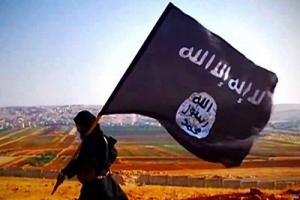ISISObama: Current strategy to defeat ISIS more likely to succeed than alternatives
President Barack Obama, in a rare prime-time address from the White House – the third such appearance in his seven years as president — described the current U.S. strategy against ISIS as more likely to succeed, and more acceptable to the American people, than alternatives such as large increase in U.S. ground forces in Syria and Iraq. Describing those who perpetrated the Sam Bernardino attack as individuals who had “gone down the dark path of radicalization,” he reassured the American people that the United States has faced, and has overcome, more daunting challenges than terrorism. He said that the best strategy to defeat ISIS without further radicalizing Muslims who live in the West is the current mix of airstrikes, support for local allies, diplomacy to end the Syrian war, and a measured increase in the number of U.S. Special Forces.

ISIS standard carried by a black-clad fighter // Source: commons.wikimedia.org
President Barack Obama, in a rare prime-time address from the White House – the third such appearance in his seven years as president — described the current U.S. strategy against ISIS as more likely to succeed, and more acceptable to the American people, than alternatives such as large increase in U.S. ground forces in Syria and Iraq. Describing those who perpetrated the Sam Bernardino attack as individuals who had “gone down the dark path of radicalization,” he reassured the American people that the United States has faced, and has overcome, more daunting challenges than terrorism.
In a thinly veiled reference to rhetoric coming from some of the GOP presidential candidates, Obama defended his existing strategy for defeating Islamic extremism, saying that “Our success won’t depend on tough talk, or abandoning our values or giving into fear…. That’s what groups like [Islamic State] are hoping for. Instead, we will prevail by being strong and smart, resilient and relentless.”
Obama stressed that any major increase in U.S. ground presence in Iraq and Syria would not only increase the number of American casualties, but would also further the risks of inciting homegrown terrorists like those who killed fourteen people in San Bernardino.
He said that the best strategy to defeat ISIS without further radicalizing Muslims who live in the West is the current mix of airstrikes, support for local allies, diplomacy to end the Syrian war, and a measured increase in the number of U.S. Special Forces.
“We should not be drawn once more into a long and costly ground war in Iraq or Syria. That’s what groups like Isil want,” Obama said. “They know they can’t defeat us on the battlefield. ISIL fighters were part of the insurgency that we faced in Iraq. But they also know that if we occupy foreign lands, they can maintain insurgencies for years, killing thousands of our troops and draining our resources, and using our presence to draw new recruits.”
Critics of the administration say it was slow to recognize the terrorist nature of similar shootings to the shooting in San Bernardino, like those in in Fort Hood and Chattanooga, but the president on Sunday acknowledged that these attacks represented a “new phase” in the terrorist threat.
